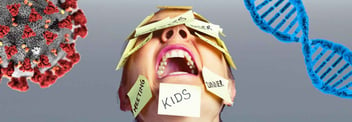Allostatic Overload, Chronic Stress, and Your Mental Health
- Home
- Blog

Reader, how was your summer? If you’re like much of the country, perhaps you found it to be a little bit lacking. While many of us anticipated a Summer of Joy, ushered in by mass COVID vaccinations, what we got instead was a Summer of Uncertainty, with the Delta variant, wildfire smoke and the climate crisis, and more tragedies throwing wrench after wrench into our plans of relaxation and fun.
This is a heavy time for our country, and our planet--and not just metaphorically. You see, when we undergo chronic stresses from our environment, our equilibrium is thrown off in such a way that can trigger our Fight or Flight response, eventually wearing down the body into a state of perpetual fatigue and unease. This “overload” of our stress response systems is called “allostatic overload”--and today, I want to dig into how this overload can cause epigenetic changes in our bodies and negative long-term mental health consequences.
What is Allostatic Overload?
In order to survive, all living organisms must maintain what is known as homeostasis. Environmental stressors constantly threaten to disrupt homeostasis in our cells. In the past, life-or-death threats like starvation, predators, and changing weather could materialize at a moment’s notice, so biologic systems known as “allostatic systems”--such as our Fight or Flight response--developed to protect our homeostasis by modulating our response to stress.
Nowadays, these sudden stressors have been largely replaced by chronic stressors that can keep our bodies in a constant state of Fight or Flight. Over time, this can produce a wear-and-tear, or “overload” of our allostatic stress response systems, resulting in inflammation of our cells and many chronic diseases including obesity, type 2 diabetes, autoimmunity, allergy, and certain psychiatric disorders.
Do our Genes Play a Role in our Allostatic Overload Stress Response?
We can now add COVID and climate change to our list of chronic stressors that plague our emotional health. Luckily, we now know that underlying genetics can determine how we can build both emotional and immune system resilience to defeat this chronic stress and improve our health.
You see, certain genetic variants can predispose us to allostatic overload and a higher stress response. As you’ve read from prior blogs, these variants can be turned “on” or “off” through various lifestyle interventions, which means that if you suffer from greater levels of stress, you may be able to take steps to mitigate your allostatic overload.
Interventions are often specific to your specific genetic blueprint, which genetic tests like Genomind’s Mental Health Map can help you determine. That said, interventions to allostatic overload may include meditation, exercise, and supplements like Vitamin D, St. John’s Wort, Ashwagandha, and others.
Reclaiming your Homeostasis and your Mental Health
Reader, it has been a hard two years for all of us. We are all struggling right now--and for many of us, seeking help in this time of chronic stress and allostatic overload may be just what the doctor ordered. Thanks to our Root Cause Psychiatry practice, Potomac Psychiatry can help you get to the bottom of your stress levels and start to ease your Fight or Flight responses during this heavy time.
.png?width=144&height=144&name=Untitled%20design%20(34).png)


.jpg?width=352&name=shutterstock_169609262%20(1).jpg)
%20(1).png?width=352&name=15235366%20(1)%20(1).png)